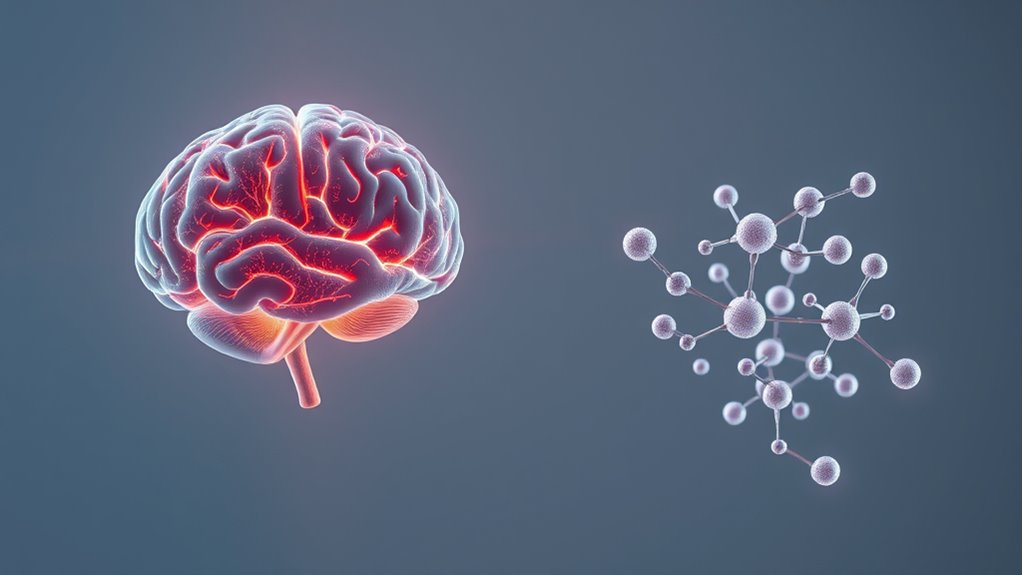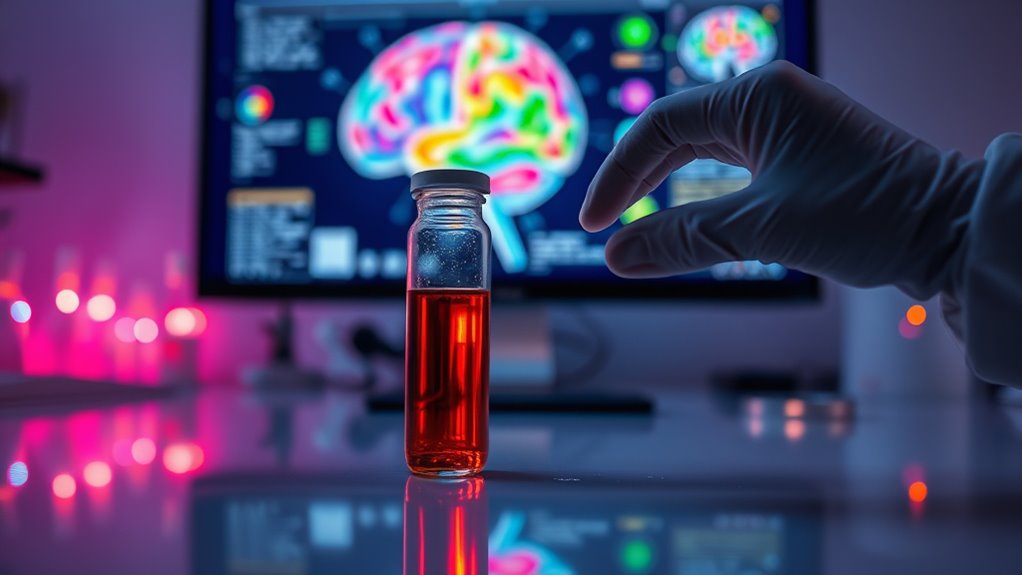Hormones play a essential role in your cognitive health, affecting memory, concentration, mood, and mental clarity. Fluctuations during life stages like puberty, pregnancy, or menopause can impair your focus and recall, while declines with age may speed up brain aging. Maintaining hormonal balance through lifestyle choices and medical support can boost your mental sharpness and resilience. If you want to uncover more about this critical connection, continue exploring how hormones influence your brain.
Key Takeaways
- Hormones like estrogen, progesterone, and testosterone directly influence memory, concentration, and mood.
- Hormonal fluctuations during life stages such as menopause or aging can impair cognitive functions.
- Imbalances may lead to increased anxiety, irritability, and mental fog, affecting overall brain health.
- Maintaining hormonal balance through lifestyle, diet, and medical support helps preserve cognitive sharpness.
- Understanding hormone-brain interactions enables proactive strategies to enhance mental resilience and delay cognitive decline.

Hormones play an essential role in maintaining your cognitive health, influencing everything from memory and concentration to mood and mental clarity. Your brain relies on a delicate balance of hormones to function best, and when that balance shifts, your cognitive abilities can be affected. One of the key factors affecting this balance is hormonal fluctuations, which are common during different life stages such as puberty, pregnancy, and menopause. These fluctuations can lead to noticeable changes in how well you think, remember, or stay focused. For example, during menopause, declining estrogen levels can accelerate brain aging, making it harder to recall names or concentrate on tasks. Understanding the connection between hormonal fluctuations and brain aging is vital because it helps you recognize why your cognitive performance may dip at certain times and what you can do about it.
As you age, your brain undergoes natural changes, and hormones play a significant part in this process. When hormone levels drop or become erratic, it can speed up brain aging, leading to issues like forgetfulness, slower processing speeds, or difficulty multitasking. This isn’t just about aging gracefully; it’s about understanding how your hormones influence the structural and functional integrity of your brain. For instance, decreased levels of estrogen and progesterone in women are linked to cognitive decline, while testosterone fluctuations in men can affect memory and spatial skills. These hormonal shifts don’t just cause temporary forgetfulness—they can contribute to longer-term changes in brain health. Recognizing these patterns allows you to take proactive steps to support your cognitive resilience. Additionally, research shows that home essentials like proper nutrition and a healthy environment can help stabilize hormonal levels and support brain health. Incorporating hormonal balance strategies may also help mitigate some of these effects, especially as part of an overall approach to brain health.
Furthermore, hormonal fluctuations can also impact your mood and mental clarity, making it harder to stay motivated or focused. During periods of imbalance, you might notice increased anxiety, irritability, or depression, which can further impair your cognitive function. Addressing these hormonal changes through lifestyle adjustments, diet, or medical intervention can help mitigate their effects. Maintaining a healthy lifestyle that includes regular exercise, balanced nutrition, and stress management can stabilize your hormones and slow brain aging. Additionally, staying engaged mentally—through learning new skills or hobbies—can bolster your brain’s resilience against hormonal impacts. Recognizing the importance of hormonal regulation in preserving cognitive function underscores the value of consulting healthcare providers for personalized strategies. Remember, your brain is adaptable, and supporting hormonal health is key to preserving your cognitive sharpness over time. Moreover, understanding the interplay of hormones and brain health enables more targeted approaches to maintaining mental agility as you age.
Frequently Asked Questions
How Do Hormonal Imbalances Specifically Affect Memory Retention?
Hormonal fluctuations can lead to memory impairment by disrupting brain function. When your hormones are imbalanced, they interfere with neurotransmitter activity and neural plasticity, making it harder to retain and recall information. These fluctuations can cause forgetfulness and difficulty concentrating. You might notice your memory worsening during hormonal shifts, such as menopause or stress. Managing hormonal health through lifestyle or medical interventions can help improve memory retention and reduce these cognitive effects.
Can Hormone Therapy Improve Cognitive Function in Aging Adults?
You might wonder if hormone therapy benefits extend beyond physical health to cognitive enhancement. While some studies suggest hormone therapy can improve memory and mental clarity in aging adults, results vary. It’s not a guaranteed solution, and risks exist. You should consult your healthcare provider to weigh potential benefits against possible side effects. Ultimately, hormone therapy could offer promising cognitive benefits, but personalized guidance is essential for safe and effective treatment.
Are There Natural Ways to Balance Hormones for Better Brain Health?
You can naturally balance your hormones for better brain health through lifestyle adjustments and dietary strategies. Regular exercise, adequate sleep, and stress management help regulate hormone levels, supporting cognitive function. Incorporate a balanced diet rich in omega-3s, whole grains, and leafy greens, which promote hormone balance and brain health. Avoid processed foods and excess sugar, as they can disrupt hormonal harmony. These simple steps can enhance your overall cognitive well-being.
What Role Do Hormones Play in Preventing Neurodegenerative Diseases?
Hormonal regulation plays a vital role in preventing neurodegenerative diseases by supporting brain health and function. When your hormones are balanced, they provide neuroprotective effects that guard against cell damage and cognitive decline. You can promote this by maintaining healthy lifestyle habits, managing stress, and ensuring proper nutrition. These actions help optimize hormonal levels, reducing your risk of diseases like Alzheimer’s and Parkinson’s, and preserving your mental sharpness over time.
How Quickly Can Hormonal Changes Impact Mental Clarity and Focus?
Hormonal fluctuations can impact your mental clarity and focus surprisingly fast, often within days or weeks. Changes in your brain chemistry due to shifting hormone levels can influence mood, concentration, and memory. You might notice foggy thinking or difficulty focusing as your hormones fluctuate. Staying aware of these shifts helps you manage their effects, and addressing underlying hormonal imbalances can restore your mental sharpness more quickly.
Conclusion
Understanding how hormones influence your cognitive health is like revealing a hidden garden inside your mind. By nurturing your hormonal balance, you can help keep your mental clarity sharp and vibrant, like a well-tended landscape. Don’t let imbalances cast shadows over your thoughts—take charge and nurture this essential connection. When you care for your hormones, you’re planting seeds for a brighter, sharper mind that blossoms with every mindful choice you make.









